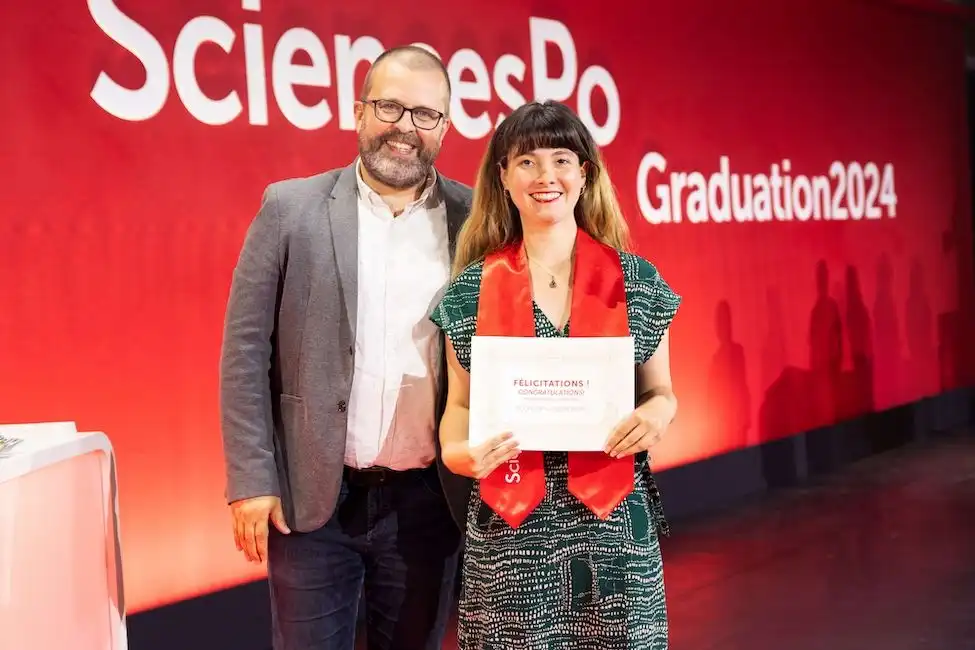Home>Portraits of 2024 graduates: Alizé Norbelly
07.02.2025
Portraits of 2024 graduates: Alizé Norbelly

Alizé Norbelly has just obtained her Master's degree in political science from Sciences Po's School of Research, along with Advanced Certification in Gender Studies. In this interview, she looks back at her academic career, which has taken her from contemporary philosophy at the École Normale Supérieure in Lyon (ENS Lyon) to political theory at Sciences Po.
Why did you decide to study gender studies?
During my university studies, I discovered feminist philosophy through the work of Iris Marion Young, an American phenomenologist who theorised the notion of ‘city life’, an urban space conducive to democratic life. It was then that I immersed myself in gender and feminist studies, which answered many of the questions and demands that I had made up to that point as a teenager and young adult. At the same time as my studies, I got involved in the feminist struggle by becoming vice-president of the feminist association at my first school, the ENS Lyon, where I studied philosophy. As part of my double degree at Sciences Po, I pursued this commitment by seeking to nourish my experience with solid theoretical tools. I took some fascinating courses on gender issues and feminist theory during my master's degree in political science. I carried out research on the way in which the expectations of victims of sexual violence of the judicial institution reconfigure French penal thought, under the direction of Astrid von Busekist, professor at Sciences Po and Véronique Le Goaziou, associate researcher at the Laboratoire méditerranéen de sociologie (Lames-CNRS). I proposed a classification of victims' expectations, and then isolated the notion of political expectation, which I would like to work on as part of a doctorate.
Would you like to tell us about a particular course you took during your time at SCIENCES PO?
At Sciences Po, I took Annabelle Lever's 'Debates in Contemporary Political Philosophy ’ course. Several sessions were devoted to studying major texts in feminist epistemology. I discovered an ambitious problematisation of the idea of gender and a constellation of theories that are constantly being renewed and discussed. I was struck by the extent of the rich debate that many women theorists have already led, particularly across the Atlantic. For my final essay, I chose to answer Ms Lever's question on ‘How, if at all, does feminist theory change (for the better or for the worse) our perspective on philosophical and political issues? I loved having to examine the major philosophical issues in the light of feminist theorisations. This work enabled me to link the two aspects of my training, first in philosophy and then in political science. The debates in Ms Lever's class provided food for thought throughout the semester and I liked the way she guided them, always leading us into theoretical territory we hadn't yet explored.
What is your best memory of your studies at Sciences Po?
My best memory is a collection of moments spent between the research library and the Crous cafeteria next door. My fellow masters students and I spent many afternoons there, working on our papers or our dissertation project. It was during these moments of work and breaks that I had some formative and ambitious discussions, often challenging my prejudices and certain ideas that I thought were solid. I think that this is the great strength that Sciences Po offers its students: a space for dialogue and debate conducive to intellectual development and the maturing of political thinking, built on a rich and eclectic education.
Do you have any advice for future graduates?
Take the time, don't panic about deadlines or final reports, but concentrate on the rare and precious opportunity to acquire a wealth of knowledge. And take the time to get involved in student associations and meet students from other Masters programmes. That, too, is part of the university experience!
What are your plans for the future?
I'm planning to complete my parallel studies at the ENS Lyon by embarking on a research career. I then plan to apply for a PhD... to be continued!
